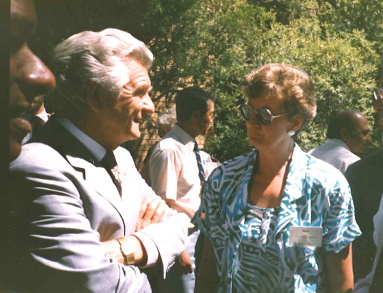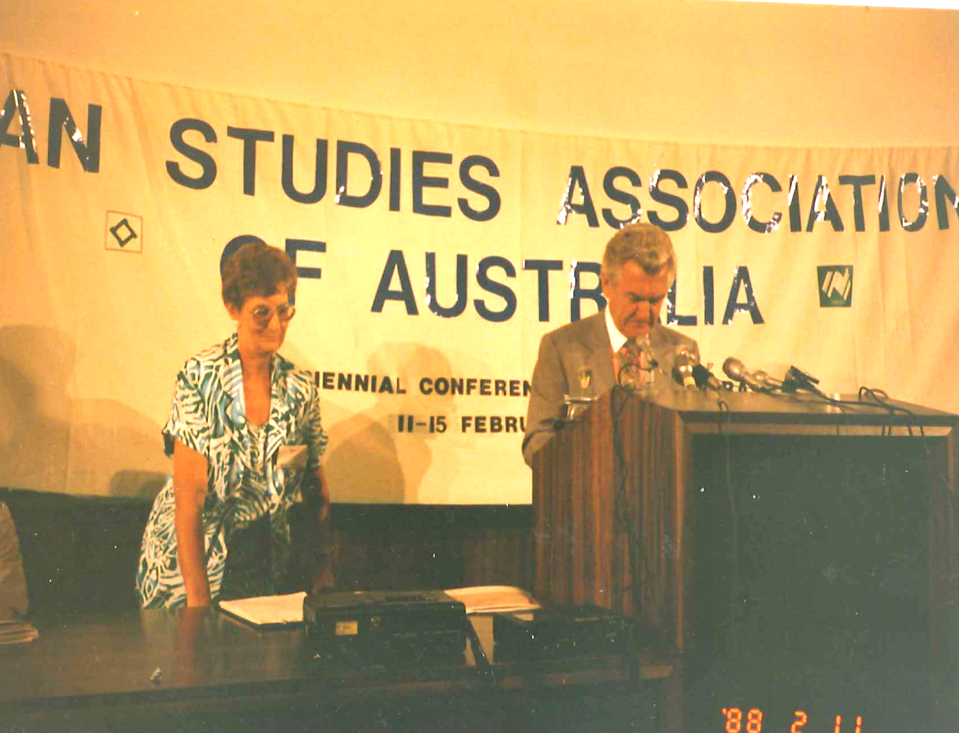Introduction
Elaine McKay had a long and distinguished career as a school teacher in Melbourne, an academic in the Faculty of Education at the University of Tasmania and as the inaugural executive officer of the Monash Asia Institute. She then became the director of the Australia-Indonesia Institute (inside the Department of Foreign Affairs) where she was responsible for developing its structures and programs. She also had a key role in ensuring that one of the Institute’s initial focuses was on supporting the teaching of the Indonesian language in Australian schools. Her later career with the Department of Foreign Affairs included working in Cambodia as part of Australia’s peace initiative and then as a member of the Australian delegation to the United Nations.
Elaine served as a member of the ASAA Council for many years. She was one of the first advocates for including teachers on its Council and tirelessly promoted the study of Asian languages and societies in schools. In a mark of her standing among members of the Council and the wider membership she is the only person to have served two consecutive terms as the ASAA president.
Early life and career
Elaine Wills was a student at the University of Melbourne in the mid-1950s. These were years when young anti-colonial Melbourne graduates, impressed by the Indonesian Republic’s success against the re-invading Netherlands, created the Australian Volunteers Abroad (AVA) for young Australian graduates to work in Indonesia in local organisations and government departments on local wages and conditions. It was a radical proposal at a time when expatriate “experts’’ still led a privileged lifestyle. Two of the key people behind the formation of the AVA were Herb Feith and Betty Evans (later Feith) both of whom were among the first Australians to go to Indonesia under the scheme.
In 1958, motivated by her exposure to support for the young Indonesian Republic at Melbourne University, by her friendship with the Feiths, and probably also by her Presbyterian background with its stress on social justice, Elaine went to Medan as a volunteer graduate to teach English at the University of North Sumatra. When Darussalam University was established further north in Kota Raja, Elaine was persuaded to fly from Medan each fortnight to teach English to its students. In Medan, Elaine met and married the British Consul, John McKay. The McKays moved to Melbourne in 1964 after the British Consulate was evacuated before being burned to the ground during Konfrontasi. The premature death of John McKay left Elaine to bring up two children on her own.
In Melbourne, Elaine taught at the Star of the Sea Catholic girls school where she persuaded the nuns to allow her to develop courses on the histories and cultures of Asian countries, with a particular focus on Islam, Hinduism and Buddhism. She later expressed her amazement – and appreciation – of how readily the nuns accepted the importance of introducing students to Asian societies.
While teaching she completed a Master of Education at Monash University, and later was invited to join a new Faculty of Education at the Tasmanian College of Advanced Education. The College was later absorbed into the University of Tasmania where Elaine spent many fruitful years teaching about Asia to generations of education students. She had a reputation as a fine teacher and produced an influential textbook on Indonesia which was widely used in schools across the country.
Contribution to the ASAA
I first met Elaine when we were both members of the ASAA Council. I remember her as a passionate advocate for the importance of the ASAA reaching out to school teachers, not just by including a teacher representative on its Council but working with them in their joint endeavour to produce ‘Asia literate’ Australians. In 1987 she was elected as the first female president of the association and was re-elected again in 1989.


Images: Elaine McKay with Prime Minister Bob Hawke at the opening of the ASAA conference in 1988 (supplied).
As the president of the ASAA, Elaine was a skilled chair of meetings, with her clear mind, good sense of humour and attention to detail. She had a capacity to include every councillor in discussions and to bring debates to a successful conclusion. Elaine, along with Stephen FitzGerald, John Legge, Jamie Mackie and Wang Gungwu, was instrumental in persuading the Australian government to establish the Asian Studies Council. As president of the ASAA she constantly lobbied the Council (and the government) – especially on the importance of providing special funding to support an expansion of the teaching of Asian languages in schools.
In her report to ASAA members in April 1988 Elaine McKay summed up her conviction of the importance of studying Asian societies and languages. In 2024, when the humanities are much diminished and the number of students studying Asian languages in schools and universities is in decline, her conviction remains as relevant as ever. She reminded members that “It is important that our work, in which we see Asian societies with their own integrity, is not subverted or compromised by those who see Asia simply in terms of markets to be exploited.”
In 2013 the ASAA Council made Elaine McKay a life member in recognition of her outstanding service to the association and her lifelong commitment to promoting the study of Asian societies and languages at all levels of the Australian education system. She will be sorely missed, but warmly remembered, by her friends, her former students and those who simply made contact with her in their professional lives.
The author thanks the many people who provided insights into Elaine McKay’s life and particularly to Paul Tickell who referred the author to a series of interviews by Elaine’s daughter (available here). Elaine’s years in North Sumatra are discussed in Ivan Southall, Indonesia Face to Face (Melbourne: Lansdowne Press, 1964) 183-4.
Feature image: supplied by Elaine McKay’s family.

